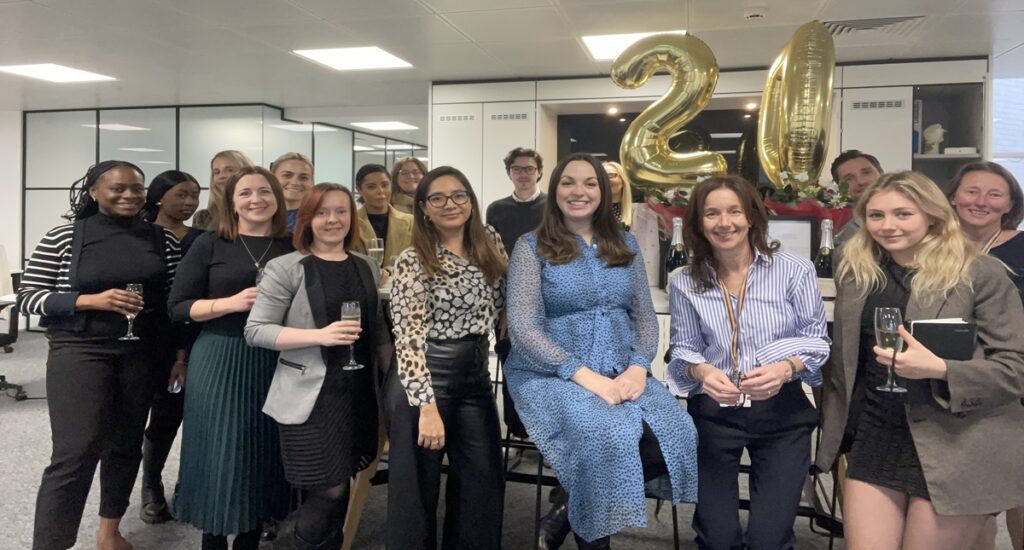The legal recruitment market has grown exponentially over the last 12 months with the legal industry coming in 4th place for the highest recruitment rate in Q4 in 2021. According to Totaljobs, Q4 of 2021 showed a 38% increase in organisations seeking new talent. These statistics show that the number of active vacancies along with the client’s desire to fill them is at a record high. Increased demand is driving prices up, which can be seen in the salaries currently on offer. If we review the statistics available from the end of 2021, the boost in salaries in 2022 is across the board. NQ Lawyers are seeing an average pay increase of 30%. For 3–5-year PQE Lawyers it sits at circa. 20% and for 6+ PQE Lawyers it is the same at 20% increases.
With the above in mind, we thought it would be good to provide clients and candidates with advice relating to processes and timeframes, face to face verses remote interviews, and hints and tips for those individuals currently in the interview process.
Interview processes and timeframes. Advice to clients:
The increase in demand for legal candidates across all PQE levels has led to organisations improving their processes at application and interview stage.
As a specialist legal recruitment agency, we advise our clients to consider the following:
Provide a timeframe for the entire interview process from the outset– stipulate final application dates, interview stages and timeframes and a date for when you expect to make an offer. It is essential with the way the market is moving now, that clients expedite their processes and avoid prolonging the process unnecessarily. Be clear with your timeframes and stick to them.
Work in partnership with the agencies you engage- if you are recruiting to a role via an agency, ensure you work in partnership with them. Taking the time to have a call with the agency to discuss the role, team fit, essential experience and skills and key legal experience will save you time in the long run. Provide a specific job description with all the relevant information required. A generic job specification means agencies are not able to target the right people and only through trial and error over a longer period, are able to identify exactly what you are looking for.
Keep the interview stages to no more than 3 stages- we advise clients to keep their interview processes simple. Candidates are considering multiple roles and offers at any one time and therefore, the more prolonged the process the more likely your organisation will miss out. Where possible we advise one stage that covers technical and competency-based questions where you can confirm the candidate can do the job, another stage where you sell the organisation, culture, benefits of working for the organisation, and scope whether the person is the right team fit. Finally, we advise a stage for the individual to meet people in the immediate and wider team. Where possible keep face to face interviews to maybe only one stage to allow you to expedite your process and keep up with other organisations and law firms. Face to face meetings are invaluable but with a more tech focused world it is important organisations move with the times when conducting their interview processes.
Ensure you sell your organisation- with most law firms and organisations offering good quality work, client facing positions and hybrid working it is essential organisations not only look to find the right fit for them but also sell the benefits of your organisation for the individual potentially looking to join you. Ensure you are clear on your benefits relating to working from home, employee health, wellbeing, rewards and bonuses and development initiatives. Candidates are not only looking at the salary on offer but the wider package.
Most importantly, PROVIDE FEEDBACK- feedback is important regardless of whether it is positive or negative. There have been numerous instances where candidates have taken the time to interview in some cases across multiple stages to be rejected but with no feedback, or for the agency to receive radio silence and no decision either way. It is important when going through the interview process you provide feedback as this builds the organisations reputation on the wider market, but also allows individuals to leave a process feeling positive about the organisation, even if they have not been successful.
How best to prepare for an interview- Candidates:
With recruitment at an all-time high and employers looking to grow out their legal teams, we wanted to give you some top tips on how best to prepare for your interview.
First impressions:
Pre – Whether you’re speaking to the organisation directly, or applying via a recruiter, first impressions really do matter. If you’re actively applying for roles, firstly, please ensure your contact details are correct on your CV and there are no spelling mistakes. Make sure you listen to your voicemails and regularly check your inbox (tip – always check your spam folder!). You should always aim to respond to any messages within 24 hours, even if you are no longer interested in the vacancy you applied for.
Peri – Communication is so important, on both sides, and its good practice to keep your recruiter up to date with anything that may change in your professional or personal circumstances. When attending interviews, virtually or in person, always remember to ask what the dress code is and choose your outfit accordingly. If you don’t have someone to ask, research the company to learn what’s appropriate.
If you have a virtual interview, ensure you are in a quiet space where you can speak freely. Please check the link to the interview and your internet connection before the interview and ensure you log on a couple of minutes before your interview time. It is better for the client to see you are waiting in the virtual “waiting room” for the interview to start, rather than attending the video interview late due to complications or issues with your connection.
If you have a face-to-face meeting, always leave extra early to account for delays. It is better to arrive at your interview location early. We advise sitting close by in a coffee shop and then arriving at the office no more than 10 minutes before your interview. Don’t arrive stressed, dishevelled, or late.
During the interview process- general tips:
You should always do your due diligence before interviewing with an organisation and do your research, so that you have a good understanding of the requirements of the job and how your background makes you a great fit. You should always be prepared to answer the typical “What do you know about us?” style of question.
Ensure you have re-read the job description ahead of your interview and highlight any key skills or experience the employer is looking for and think about examples from your current or past roles that align with these requirements.
Keep your answers short and focused, making sure that you actually answer the question you’ve been asked. Your time with each interviewer is limited so be mindful of rambling. Let your interviewer lead the conversation but ensure you provide enough context behind your answers.
Hiring managers are looking for positive and upbeat employees, so try to deter from speaking negatively about your current or former employer or colleagues, and instead try and use your negative experience and turn it into a positive by focusing on what you have learned and what you want to do next.
Post – Your feedback is important, and you should always aim to give your recruiter a breakdown of how you thought the interview went and if you have any questions or concerns about the organisation, or role in general. When you receive an offer, it’s understandable that you might want some time to think it over, or speak with your significant other, but it’s important not to take too much time as it may send the wrong message to your future employer. If you have been unsuccessful in the process, then it’s important to be thankful for being considered and use this time to reflect on your performance and use it as an opportunity to learn and grow for future interviews.
With the market more competitive than ever before, it is essential that clients as well as candidates are constantly putting their best foot forward. Of course, salaries, flexibility, incentives and culture are key factors to the decisions individuals make regarding their next role, but the interview experience pays a much bigger role than many actually realise. The interview process is where both parties get a feel for the other, and whether you are the right fit. Make sure that experience is as positive as it can be to provide you with the best possible chance of getting your perfect match.
Should you wish to discuss the market, active requirements or are looking for a new role, please do get in touch with us directly.
Read the article and comment on LinkedIn



